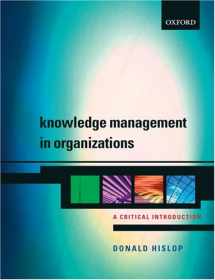
Knowledge Management in Organizations: A Critical Introduction
ISBN-13:
9780199262069
ISBN-10:
0199262063
Author:
Donald Hislop
Publication date:
2005
Publisher:
Oxford University Press
Format:
Paperback
288 pages
FREE US shipping
Book details
ISBN-13:
9780199262069
ISBN-10:
0199262063
Author:
Donald Hislop
Publication date:
2005
Publisher:
Oxford University Press
Format:
Paperback
288 pages
Summary
Knowledge Management in Organizations: A Critical Introduction (ISBN-13: 9780199262069 and ISBN-10: 0199262063), written by authors
Donald Hislop, was published by Oxford University Press in 2005.
With an overall rating of 4.4 stars, it's a notable title among other
books. You can easily purchase or rent Knowledge Management in Organizations: A Critical Introduction (Paperback) from BooksRun,
along with many other new and used
books
and textbooks.
And, if you're looking to sell your copy, our current buyback offer is $0.6.
Description
This textbook provides a critical review and analysis of the key themes that underpin the subject of knowledge management in organizations. Adopting a thematic approach, Hislop presents the key debates and a wide range of perspectives in knowledge management. The book begins by presenting the epistemologies of knowledge, asking what do we mean by knowledge? How is knowledge processed within the organization, and how is this linked to human motivation. Part 2 discusses the social and cultural issues that surround the managing and sharing of knowledge. The dynamics of knowledge sharing and knowledge generation are examined, illustrating the different aspects of the collective and shared nature of organizational knowledge. This section also looks at how knowledge processes are shaped by the conflict and politics within the organization and demonstrates how and why knowledge and power are inextricably linked. Finally, the roles of information technology in the process of knowledge management and that of HRM and culture - the human element of knowledge - are presented. Part 3 examines how we learn and acquire knowledge and examines the debates surrounding the learning organization. Finally, the book moves away from its thematic approach to specifically examine the character and dynamics of knowledge sharing in three contemporary organizational forms: the networked/virtual organization, global multinationals and, knowledge intensive firms and knowledge workers.


We would LOVE it if you could help us and other readers by reviewing the book
Book review

Congratulations! We have received your book review.
{user}
{createdAt}
by {truncated_author}


